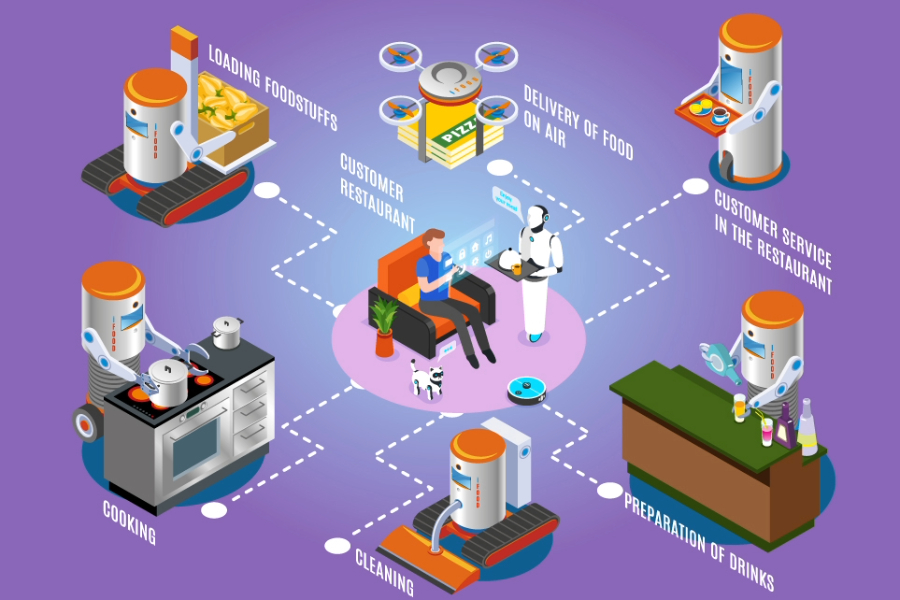A Delectable Dive into Machine Learning’s Role in the Food Industry
Machine learning is the process of teaching computers to carry out tasks without explicit instructions by using statistical models and algorithms. This technology is used in the food sector to forecast results, optimise workflows, and get insights that eventually help with well-informed decision-making.
How is machine learning applied by Zomato?
Zomato, a prominent player in the meal delivery sector, employs Machine Learning models to facilitate training and prediction by utilising three key features: input, output, and brain. Input and output are combined in model training to jointly represent the brain.
What uses does machine learning have in food safety?
Emerging applications enabled by a machine learning approach have been observed for foodborne pathogen genomes and novel data streams, including text, transactional, and trade data. These applications include the prediction of antibiotic resistance, source attribution of pathogens, and foodborne outbreak detection and risk assessment.
What role does AI play in the food industry?
Artificial neural networks are used by AI algorithms to track food shipments at every step of the supply chain. This guarantees that the food satisfies all safety requirements. In the food business, artificial intelligence mostly plays a role in producing precise projections for pricing and inventory management.
In what ways does AI apply to food processing?
The advantages and challenges of artificial intelligence in the food industry…
AI-machines can use sophisticated X-ray scanners, cameras, and lasers to sort food according to size, colour, and weight. Artificial intelligence (AI) robots can analyse food quality and categorise food based on quality requirements. In addition to eliminating human mistake, AI-assisted food sorting speeds up the process.
How is machine learning applied by Swiggy?
With the use of a neural search tool, Swiggy users can now find groceries and food in a conversational way. Here, customers get recommendations that are specifically suited to their questions.
An Overview of Machine Learning in the Food Industry
Machine learning is the process of teaching computers to carry out tasks without explicit instructions by using statistical models and algorithms. Within the food business, this technology is used to forecast results, optimise workflows, and provide insights that help with making well-informed decisions.
Improving Food Safety and Quality
It is crucial to guarantee the food products’ safety and quality. Through the detection of pollutants, prediction of deterioration, and identification of anomalies, machine learning algorithms are essential for the monitoring and maintenance of food quality. These instruments enable prompt interventions to maintain the integrity of food products by facilitating real-time monitoring.
Optimisation of the Supply Chain
For the food sector, effective supply chain management is essential. Businesses may optimise their operations and maintain ideal stock levels with the use of machine learning, which helps with demand forecasting and inventory management. Anticipating customer demand, cutting surplus inventory, and lowering supply chain expenses are all made easier with the use of predictive algorithms.
Customised Client Experience
In order to give customers a personalised experience, machine learning is essential. Businesses can recommend food items based on customer purchase history and personal preferences by utilising recommender systems. Long-term connections are fostered by this level of personalisation, which improves client happiness and engagement.
Nutritional Evaluation and Meal Scheduling
It is crucial to comprehend food’s nutritional value in order to encourage healthy lives. Accurate analysis of the nutritional content of different food products is achieved through the use of machine learning. It also helps in the creation of customised diet regimens that take into account dietary restrictions and personal health goals.
Difficulties and Ethical Issues
Despite its enormous potential, machine learning in the food business is not without its difficulties. There are challenges in implementing and integrating this technology, including as infrastructure readiness, model accuracy, and data privacy. To achieve responsible application, ethical factors including the fair use of customer data must be properly taken into account.
Machine learning is going to play a huge role in the food business. Future uses could include enhanced robotics in processing, real-time quality monitoring throughout food manufacturing, and personalised nutrition planning based on a person’s genetic makeup. The food sector will surely change as machine learning develops further, becoming more consumer-focused, sustainable, and efficient.
Source

